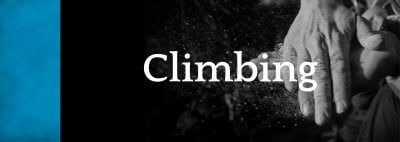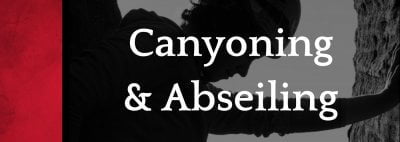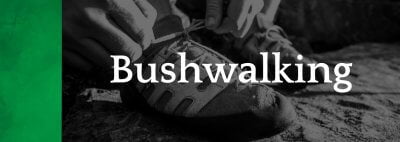If you can’t find the answers you’re looking for, ask us a question!
Yes. Check out our climbing language glossary.
The peak climbing seasons here are autumn (Mar-May) and spring (Sep-Nov). With crisp temperatures averaging between 8°C and 15°C, spring and autumn offer perfect friction and great conditions for climbing in the shade or sun (but make sure you bring warm layers for when you’re on belay!)
Winter is also a great time for climbing in the Blue Mountains, as many of the classic vertical crags are sun-soaked through most of the day, making them lovely places to hang out.
Summer is probably the least optimum time for climbing in the Blue Mountains, as hot temperatures can limit your options to morning or afternoon sessions or steep sport climbing areas, which catch more shade. The heat also takes its toll on your fingertips as the local sandstone is quite abrasive.
Yes. Our courses run any day of the year except Christmas Day and New Years Day. Minimum numbers apply, please check your course page for details.
If you have a particular date and instructor in mind we recommend booking well in advance.
Yes. Our full Terms and Conditions are available during booking (and definitely before you confirm and pay..)
For now, if you would like to cancel your course before the start date, the following fees apply:
- 2 weeks and over no charge
- 8-14 days: 25% of course fare
- 3-7 days: 50% of course fare
- Less than 3 days – full fare price.
If your course is cancelled due to the weather, your course will be rescheduled or we will issue you with a gift voucher valid for 3 years. Refunds may be available at the discretion of the Blue Mountains Climbing School. Any refunds will also incur processing fees (3.35%). We may, at our discretion, reduce, transfer or waive your loss of fare or any processing fees for any reason.
We run our courses in all but the most extreme weather conditions. Moderate wind, drizzle and mist do not affect the safety of our operations and your course will run as normal. If we have concerns about the weather we’ll try to let you know in advance, and if you’re concerned then please feel free to give us a call; we are always happy to chat.
That said, Blue Mountains Climbing School management and staff reserve the right to cancel or continue courses in weather at their discretion. If your course is cancelled due to the weather, your course will be rescheduled or we will issue you with a gift voucher valid for 3 years. Refunds may be available at the discretion of the Blue Mountains Climbing School.
If you decide not to attend due to weather against our policy or advice, you will be charged the full course fee.
On the rare occasions that the weather surprises us, sometimes we find ourselves making safety decisions on the day of your course.
More information coming soon . . .
Comfortable clothes suited to the conditions. Weather can be very variable in the mountains, so come prepared! As a general rule we recommend:
- Long sleeves and pants for sun and scratch protection
- Wool, synthetic and fleece fabrics (no cotton or denim)
- Closed shoes
- Sun hat, sunscreen
- Rain jacket
- If you’re coming in winter, bring a beanie, gloves and a warm jacket.
Water bottle – at least 1.5 litres.
Personal medication (ventolin/EpiPen etc.)
A notepad and pen (or your printed course notes) – to take notes.
Camera or Smartphone – there are heaps of good photo ops throughout our climbing courses. Photographs are also a helpful way to document and remember what you learn.
Climbing Gear – we recommend that you bring any gear you have, and we’ll discuss the equipment on the day.
Food – Please bring your own lunch, or grab something in Blackheath on the morning of your course. We recommend the awesome sandwiches at the Altitude Deli. We also recommend bringing some snacks to provide bursts of energy during the day
Absolutely. We encourage you to bring your own climbing gear.
One day Introduction to Outdoor Climbing sessions and private guided days include a delicious lunch from the Altitude Cafe in Blackheath unluess otherwise specified.
For all instructional courses, lunch is available as an optional extra selected at time of booking. We have found that many students prefer to provide their own lunch and this keeps costs to a minimum. The Altitude Cafe makes a range of gourmet sandwiches and can cater to most dietary requirements (we haven’t found one yet they can’t do), just let us know and we will send you a lunch menu. Alternatively you can buy your lunch at Altitude Cafe on the day, they offer discounts to Climbing School students
If you have a severe allergic reaction to some foods let us know and we ensure your lunch is kept entirely separate from others that may contain the allergens.
Generally, the minimum age for technical climbing instruction is 17 years. All participants under the age of 18 must have a waiver form completed by their parent or guardian and must be accompanied by a parent or guardian, except where prior arrangement has been made.
If you are under 17 and would like to participate in a climbing course, please contact us. Concessions may be possible for technical courses under certain circumstances and we do run a Young Guns Learn to Lead course specifically designed for young current keen gym climbers wanting to learn to lead.
No. Our courses aredesigned to teach recreational skills, not guiding skills, however we can deliver custom courses modelled on the National VET system to ensure easy pathways to formal accreditation. If you would like to discuss what this involves then please contact us to discuss your goals.
Yes. You can buy gift certificates for any course or any amount, and we will send you a printable PDF certificate via email.
If you would like to give an official printed gift certificate we’d love to send one out. It costs $5 extra and every cent goes to Crag Care, a local community organisation working to maintain access to Blue Mountains crags through community track care and rehabilitation days.
Yes: see https://climbingschool.com.au/gift-certificates/
BMCS gift certificates are valid for any course or guided day for 3 years from the date of purchase.
They can be used to pay for part of a course and are fully transferable.
If you don’t use the full value of the voucher you will be issued with a new voucher for the remaining balance.
Climbing in the Blue Mountains
Climate
The climate in the Upper Blue Mountains is quite different from Sydney. Blackheath is 1065 metres (3494 ft) above sea level, and temperatures here are often cooler than at sea level – sometimes by up to 10°C. During winter (Jun-Aug) the average temperature in the Upper Mountains is around 5°C (41°F), while in summer (Dec-Feb) the average daytime maximum is around 23°C (73°F) but can climb well into the 30’s (90°F+).
The Blue Mountains has similar rainfall to Sydney, with the Upper Blue Mountains receiving an average of around 1050mm (41inches) per year. The upper Blue Mountains also occasionally experiences snowfall, but despite the cool temperatures there are rarely more than 5 snow days per year.
For more info, please visit: http://www.bluemts.com.au/info/about/climate/
Weather
Blue Mountains weather is often very localised and variable. Often it will be storming in one part of the mountains and sunny in another, and it can change quite rapidly throughout the day.
Blackheath often experiences misty mornings, caused by cool air sinking into the valleys overnight and rising and dawn. This mist generally burns off to clear blue skies by midday. If you arrive to a misty morning, please do not be discouraged. Our guides know these mountains, and there are many areas which stay dry in all but the most torrential rain.
If you have any concerns about the weather, please call our office early on the day of your trip.
Driving by Car
If you are coming to the mountains for a course, driving is the easiest way to access some of the sites that we use. If you can’t drive or don’t have access to a car please let us know and we will make travel arrangements for you when you arrive in Blackheath.
The scenic drive from the Sydney CBD to Katoomba takes about 2 hours. It can take much longer if you travel on public holidays, during peak times, or if there is road-work, so check before you drive. If you leave the city before 7am you will generally avoid most of the traffic.
Once you are out of the CBD start following signs towards Parramatta, Penrith or Katoomba and enter the M4 Motorway heading west.
After about 50 minutes you will cross the Nepean River and begin your ascent into the Blue Mountains. Here, the M4 changes its name to the Great Western Highway and begins its winding journey up through the villages of the Blue Mountains to Blackheath.
By Train
If you aren’t able to drive to the Blue Mountains, let us know and we will make travel arrangements for when you arrive in Blackheath.
The train is one of the fastest and easiest ways to get to Katoomba from Sydney. It’s also the most convenient and eco-friendly. Bonus!
The total travel time is about 2.5 hours. There are toilets on the train, and we would recommend taking some snacks and your water bottle with you for the journey. Details about the facilities available at Blackheath train station can be found on the Trasnport for NSW website: Blackheath Train Station
We also recommend getting a seat upstairs on the left side as you leave Central to make the most of the spectacular views over Glenbrook Gorge and across the Blue Labyrinth, where the wilderness extends south for over 100km. As you get closer to Blackheath you will start getting glimpses of the iconic blue hazed eucalypt forests and famous cliff walled valleys.
To find out the latest timetable and fare information, phone 13 15 00, or go to www.transportnsw.info.
Make sure to check if there is track-work on the day of your trip and allow extra time for the journey.
The short answer is yes. The long answer is that it will limit the areas that you can climb in. A lot of the crags are more than walking distance from the train and bus stations, and having a car makes things much more convenient.
If you are visiting without a car, check out these crags, which are just a few kilometres walk from the train station:
Medlow Bath Station
- Medlow Bath
Blackheath Station
- Shipley Upper
- Porters Pass
- Centennial Glen
Mt Victoria Station
- Boronia Point
- Pindari
- Mt Piddington
- The train is a convenient way to travel between the villages of the Blue Mountains. To find out the latest timetable and fare information, phone 13 15 00, or go to transportnsw.info
- The Blue Mountains Bus Company runs limited local bus services in the Blue Mountains. You can find their routes and timeables here: http://www.bmbc.com.au.
- Hertz is the only car hire company in the upper Blue Mountains and is reasonably close to Katoomba and Leura Train Stations. A hire car is a great option if you have made your way to the Blue Mountains by train and you would like to camp out or explore beyond the towns.
- Taxis are common in Leura and Katoomba but are a little harder to come by in some of the other villages.
There are free public campsites with drop toilets at Mount York and Perry’s Lookdown (Blackheath).
Please remember to use Leave No Trace principles and care for this beautiful wilderness.
If you would prefer to camp somewhere closer to town with running water, plumbing and maybe even cooking facilities, there are caravan parks in Katoomba and Blackheath. Powered sites, unpowered sites and accommodation are available.
Hostels
There are several friendly, comfortable youth hostels in Katoomba.
Flying Fox Backpackers allows backpackers to camp in their backyard with access to their facilities.
There are heaps of great places to find relatively accessible, easy routes in the Blue Mountains. Some of the most popular sport climbing areas for beginners are the Dam Cliffs, The Soft Parade, Mt York, Bardens Lookout, New York, Shipley Upper and Medlow Bath.
There are also many areas that offer great easy climbing for people who have self rescue, abseiling, multi-pitch and traditional climbing skills.
More information coming soon.
Information coming soon.
Information coming soon.


